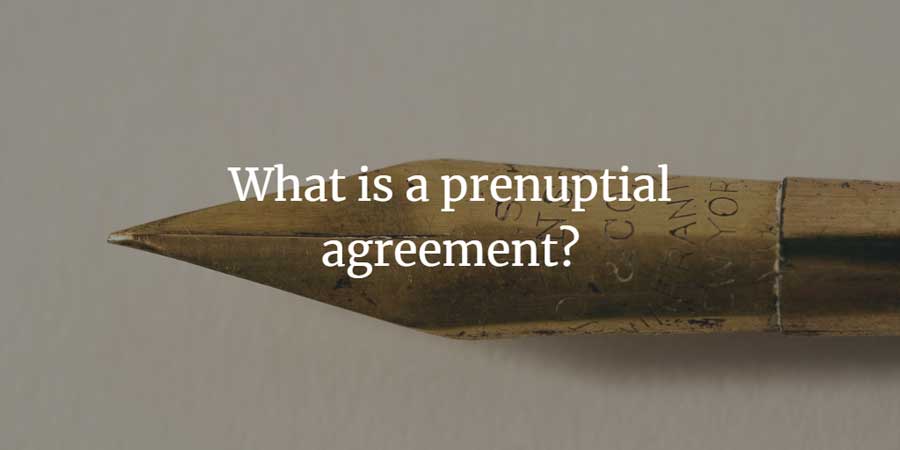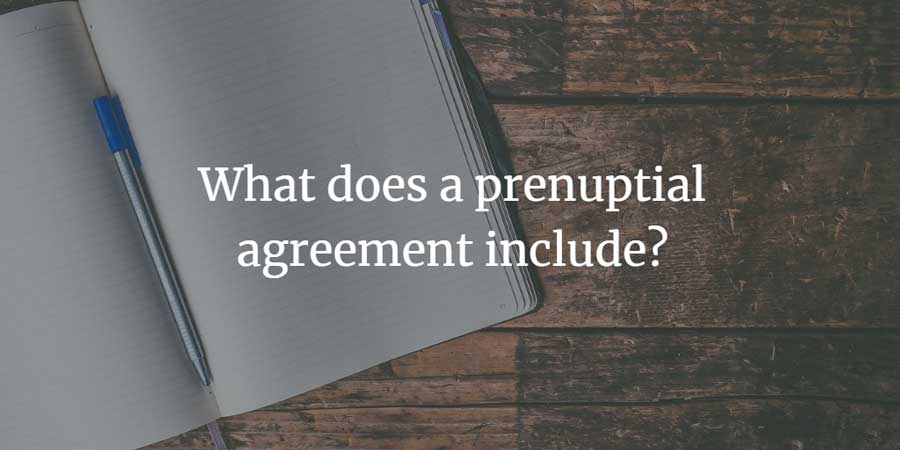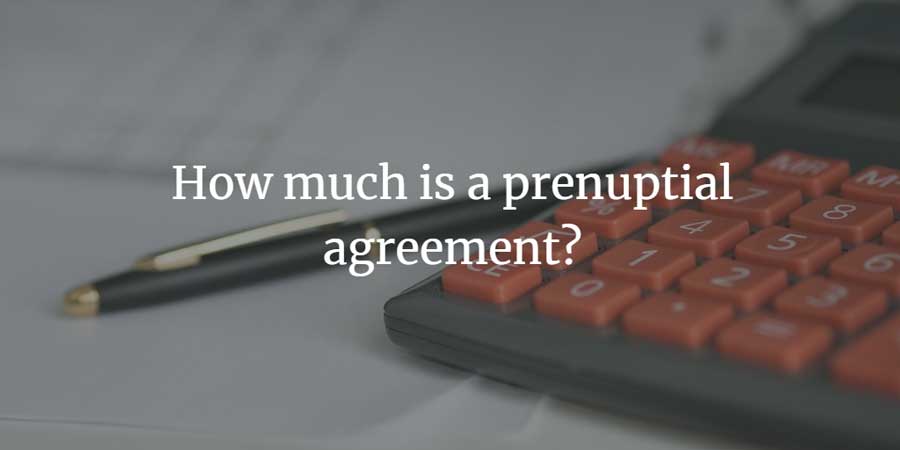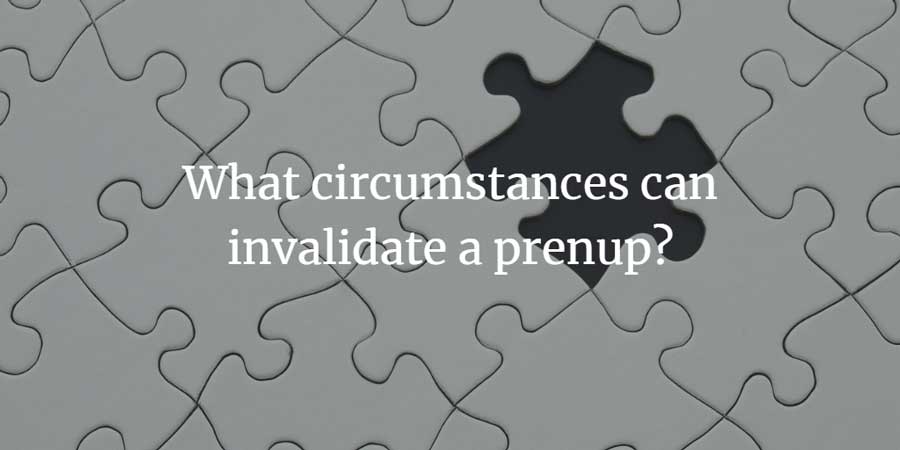Prenuptial agreements | A complete guide

A prenuptial agreement is a bespoke document drawn up by a solicitor or lawyer. It is a sound and sensible way to protect the assets you have worked hard for, when entering into a marriage or civil partnership.
Many people shy away from putting a prenuptial agreement (or ‘prenup’, for short) in place for fear that they are being ‘unromantic’. However, just as you would protect your assets and other interests in your will, having an agreement drawn up by a specialist lawyer can give you peace of mind, security and confidence.
In business scenarios, it is commonplace to have a shareholder agreement in place should any problems occur in the future. Similarly, a prenuptial agreement offers future security and enables both parties to a relationship to be clear about what would happen if they separated. While the vast majority of couples enter a marriage or civil partnership expecting it to last a lifetime, sadly official statistics show that this often doesn’t turn out to be the case.
A prenup can act as a sensible insurance option, and whilst not the most romantic of conversations to be had at the outset of a relationship, the certainty of outcome achieved, or intended to be achieved can help to reduce the conflict and confusion that often arise when a relationship breaks down..
Our family law team has put together this handy FAQ guide to help you learn more about how prenups work. If you are looking to instruct a prenuptial agreement solicitor or lawyer to get a document drawn up, please get in touch and we will be happy to assist you.
Need specialist assistance? Contact us.
Contact usFrequently-asked questions:
Click the links to jump to the answers.
- How can I protect my assets before entering into a marriage or civil partnership, in UK law?
- What is a prenuptial agreement?
- Are prenups always recognised by the courts?
- Can I get a prenup after marriage or entering into a civil partnership?
- Who are prenups suitable for?
- Do I need a solicitor to make a prenuptial agreement?
- How common are prenuptial agreements?
- Does a prenup protect both parties?
- What does a prenuptial agreement include?
- What financial information do I need to provide at the outset?
- When should we make a prenup? Does it have to be before marriage?
- I have a business. Can a prenuptial agreement protect my business interests?
- Do prenups expire?
- How often do I need to review my prenup?
- Does adultery affect a prenup?
- How do prenups work in practice in the UK?
- Are prenups legally binding in the UK?
- Do I need a prenup if I’m not married?
- How much is a prenuptial agreement?
- What could happen on divorce if I do not have a prenup in place?
- What circumstances can invalidate a prenup?
This information is a general guide only, and there’s no substitute for tailored advice. If we can assist you with creating a bespoke prenup that fits with your individual circumstances, please do get in touch.
Need specialist legal advice? Contact us.
Contact usHow can I protect my assets before entering into a marriage or civil partnership, in UK law?

A prenuptial agreement is the best way to clearly set out your assets and what you and your partner intend to happen to them should your marriage or civil partnership end.
While not enforceable “per se” in the UK jurisdiction. the courts do very much seek to uphold them provided they are valid and properly drawn-up. They therefore play a persuasive role in financial settlement discussions, but are not followed strictly if the outcome of the implemented agreement is unfair.
The law in relation to nuptial agreements differs from country to country. If you or your partner have links to other countries, you plan to move to live abroad or have assets overseas, you may also need a prenuptial agreement in more than one jurisdiction.
It is vital that your prenuptial agreement is valid, fair and clear, meaning certain conditions must be met. This is why it’s advisable to use a solicitor or lawyer to draw up an agreement for you, rather than attempt to draw one up by yourselves.
Need specialist advice on protecting your assets prior to a marriage or civil partnership? Get in touch.
Contact usWhat exactly is a prenuptial agreement?

A prenuptial agreement is a document, which contains details of all the different assets that each party has prior to entering into a legally committed relationship. It sets out their intentions as to division of such property in the event of a relationship breakdown. These assets can include things like property and business interests, inheritance, debts and liabilities.
It can also be used set out what any children, particularly those from previous relationships, may receive from your shares of property if you split up.
Get in touch if you’d like assistance with creating a bespoke prenuptial agreement.
Contact usAre prenups always recognised by the courts?

In 2010, the UK Supreme Court ruled that a prenuptial agreement was binding in the case of a German paper company heiress, where the husband had taken no legal advice before entering into the agreement and where the outcome of the agreement appeared unfair.
The Court of Appeal initially felt that Katrin Radmacher, thought to be worth £100m, should be protected by the terms of her German marriage contract. This is a decision which her former husband, Nicolas Granatino, had been fighting to get overturned. Although Granatino had agreed not to make any claims on Radmacher’s fortune in the event of a split, he was awarded £5.85m in 2008 by a High Court judge.
Radmacher challenged that decision. The Court of Appeal agreed that the couple’s pre-nuptial agreement should have been more influential. They slashed his lump sum payment to about £1m. He also received a £2.5m fund for a house, which would be handed back to Ms Radmacher when the younger of their two daughters (aged seven) reaches 22.
In asking the Supreme Court to reverse the decision, Granatino argued that being forced to accept the smaller settlement would leave him in financial ruin. Also, he had not taken legal advice – normally an essential pre-requisite. However, the court found that he had been given the opportunity to take legal advice – and could afford it – so refusing to do so did not negate the agreement that he had freely entered into.
Before this appeal court judgment, the courts had began to attach far greater weight to agreements entered into freely by spouses. This case reinforced the recognition in a modern society that parties in a relationship with one another can enter into arm’s length contractual relationships too. This is a concept that wasn’t thought possible historically.
So, in circumstances where parties have freely and voluntarily entered into a prenuptial agreement, with the benefit of all relevant information and full disclosure of their financial circumstances leading up to the date of marriage or civil partnership and are informed of its implications, a court is likely to uphold the contents on any subsequent divorce or dissolution, subject to test of fairness, which will always be applied. Generally, there is a presumption in favour of upholding the terms of any prenup, with the onus (a substantial one) being placed upon the party seeking to try and depart from it.
Get in touch for specialist, friendly legal advice.
Contact usCan I get a prenup after marriage or entering into a civil partnership?

This would be a post-nuptial agreement.
The principles for post-nuptial agreements are exactly the same as for prenups, except they are not entered into in contemplation of a legally committed relationship as the parties are already in one. A married couple can still enter into arms-length contractual agreements. They may wish to ringfence money or assets coming their way after the date of marriage or civil partnership, perhaps for example, by inheritance or a gift.
In some cases, a post-nuptial agreement is needed to ratify terms proposed in a prenuptial agreement that perhaps wasn’t considered sufficiently ahead of a date of marriage or civil partnership. This is to eliminate later claims of undue pressure being applied to enter into it, and so make its terms void.
A period of at least 28 days is required between the signing of a prenuptial agreement and the planned big day. Talks of ringfencing certain assets should ideally begin some months prior.
Interested in finding out more about post-nuptial agreements? Contact us for specialist advice.
Contact usWho are prenups suitable for?

Contrary to popular belief, you don’t need to be extremely wealthy or famous to benefit from having a prenup in place. You might, perhaps, have business investments that you want to ring-fence, or you could have had help from your family when buying your house. You may have even inherited a large chunk of money and want to specifically protect this, or your savings, for example. You could have children from a previous marriage and want to set aside some money or property for their inheritance. There are a wide range of scenarios for which a prenuptial agreement is a suitable and sensible precaution.
Often, clients approach us looking to prepare one of these documents if they have more money or higher-value assets than their intended. This disparity is a common reason for seeking an agreement; one party would have much more to lose than the other, should circumstances change or the relationship turn sour. This can be the case also if one party has a higher long-term earning potential, or potential return from investments, which could lead to disparity.
Prenups are an often-overlooked and underestimated tool for financial security in the future. One of the big benefits which is not often talked about is how they can potentially save you money in the event of a breakup, making costly litigation much less likely.
Could a prenup be a suitable option for you? Contact us to find out more.
Contact usDo I need a solicitor to make a prenuptial agreement?

Taking legal advice, meaning using a solicitor or lawyer (for example a chartered legal executive) is sensible for both of you to do before you sign the prenup. There are lots of templates available on the internet, but if you want your prenup to have the best chance of being upheld by a judge, it has to be fair and unambiguous.
Furthermore, each party should get independent legal advice, so you can’t use the same lawyer for both of you. This ensures that no-one is being taken advantage of unfairly.
Another requirement is that, when signing your prenuptial agreement, it should be witnessed as it is a formal deed. The witnesses’ details, including their full name, address and occupation, will be recorded in the agreement. The witnesses must be adults and not related to you.
Get in touch with one of our specialist prenuptial agreement solicitors and lawyers.
Contact usHow common are prenuptial agreements?

As courts in England and Wales continue to give more and more weight to prenuptial agreements, we are seeing them rise in popularity.
A combination of increasing ages of couples getting married, and increasing numbers of remarriages and children of separated parents, seems to be helping to shake off the stigma of planning for a divorce situation before it has happened.
We’re here to help with your legal questions.
Contact usDoes a prenup protect both parties?

A prenup is only valid if it is fair, so both parties should be protected.
It is very important that neither party should feel that they have been pressurised into entering an agreement. Both must do it voluntarily and of their own free will, having taken independent legal advice before signing.
Furthermore, recognition will have to be given to changing the agreement as time goes by. What constitutes a fair division after a short marriage will not necessarily be fair after a marriage of many years.
Get in touch for clear, friendly legal advice.
Contact usWhat does a prenuptial agreement include?

You can include any assets you want to. However, the most common ones covered in a prenup include property (like your family home or any other property you own), your money (such as your savings, pensions, and even your business investments), details of any of your debts and who is liable for these if you split up, what your children – to include those from any previous marriages – will be entitled to, and details of any assets that you’ve inherited or set to inherit.
Again, this isn’t an exhaustive list, and you can include almost any assets that you like, even pets!
Would you like bespoke advice on this? Contact our lawyers.
Contact usWhat financial information do I need to provide at the outset?

You will need to be completely open and honest about the extent of your assets, your future assets and your debts and liabilities. Both parties must disclose to each other their assets and liabilities and financial circumstances generally. This disclosure will normally be appended to the agreement. It is important to be full, frank and honest.
Clients often ask us how debts are treated in prenups. If you are entering into a marriage or civil partnership with someone who has significant debts that are still to be repaid, it is understandable for you to have concerns over how these debts might be dealt with should you break up. In this scenario, a lawyer may be able to structure a prenuptial agreement to include a special mechanism – a ‘debt clause’ – which shields you from liability.
Can we help you?
Contact usWhen should we make a prenup? Does it have to be before marriage?

Yes, a prenuptial agreement does need to be made before you get married or your civil partnership is formalised.
It should be entered into sometime before the marriage takes place. Many people say at least six weeks before the wedding is the minimum. Most agree that less than three weeks would be insufficient. So it is important to act sooner rather than later!
Officially, the prenup should be signed at least 28 days before the marriage.
Contact us for bespoke advice on creating a prenup.
Contact usI have a business. Can a prenuptial agreement protect my business interests?

Divorce of a business owner can be risky for a company. When a couple divorces or a civil partnership is dissolved, business assets are treated like any other asset and will be factored into the resulting financial settlement. Even if you started your business prior to marriage or entering into a civil partnership, you could still risk losing some of your business interests if you split up, provided you don’t protect these properly beforehand.
Putting a prenuptial agreement in place enables you and your significant other to agree on a fair way in which your assets might be divided should you eventually split up. If, for instance, you already hold shares or have business investments before entering a marriage, a lawyer can help you to structure a pre-nup to protect these. This must be agreed with your partner since you both need to sign it, and it does need to be fair.
Should the worst happen and you split up without arrangements in place, you might find yourself in a position where your partner is entitled to a proportion of your business interests, which can of course have significant knock-on effects for others involved in your business.
Remember, there are additional ways of protecting your business assets should the worst happen.
Contact us for legal advice on protecting your business interests.
Contact usDo prenups expire?

Prenups do not expire, unless an end date has been specifically included within the document and so it will run for the duration of the marriage. The prenup can include a review clause to make sure that it is still fair to both parties as the marriage goes on.
A prenup can also be varied if necessary, say as a result of financial circumstances changing during the marriage which would no longer make the original prenup fair and reasonable. This can be done by another document being drawn up in the same way as the original prenup.
Get in touch with our family law team for clear, friendly legal advice.
Contact usHow often do I need to review my prenup?

Whilst you cannot predict what future events may occur which change your financial circumstances, you could agree to review the prenup on certain events happening, for example, upon the birth of a child or one of you receiving a significant inheritance or disposing of a group of assets.
The other option is to ensure that the prenup is reviewed after a certain period of time, such as every five years.
If you would like guidance on reviewing or amending your prenuptial agreement, please get in touch.
Contact usDoes adultery affect a prenup?

Unless your prenup specifically states that it does, then no, adultery committed by one spouse would not affect the terms set out within the prenup.
Questions about creating a prenup? Contact us.
Contact usHow do prenups work in practice in the UK?

When it comes to divorce and resolving the finances between you, a well-drafted prenup that is still fair and reasonable for both spouses at the time of the divorce can prove very helpful. The terms of the prenup can simply be written up into a financial order for approval by the court.
If, at the end of the marriage or civil partnership, one person is seeking more of the income or assets than was agreed in the prenup, they can contest it and pursue matters further. However, the court would consider the prenup as one of the circumstances of the case and give it due weight, if all of the safeguards have been met when preparing it and it would still result in a fair outcome to both at the time of the divorce.
Need expert guidance? Contact us.
Contact usAre prenups legally binding in the UK?

At present, prenups are not legally binding as you cannot override the court’s ability to apply the relevant factors under the law in this area and make a financial order on divorce. However, the Supreme Court in Radmacher v Granatino made it very clear that the court must give appropriate weight to the terms of a prenup when determining a case.
It was noted that the court should give effect to a nuptial agreement that is freely entered into by both parties with a full appreciation of its implications unless it would not be fair to do so.
Get in touch for bespoke advice on preparing a prenup.
Contact usDo I need a prenup if I’m not married?

No, but you should give consideration to putting a prenup in place if you are contemplating getting married in the not-too-distant future. If you are living with a partner (or planning to), then you should instead think about protecting yourself financially by entering into a cohabitation agreement instead.
Contact us to find out more about preparing a cohabitation agreement.
Contact usHow much is a prenuptial agreement?

The cost of a prenup very much depends on the complexities of your financial circumstances and the amount of assets involved. It is best to contact a lawyer who can take some initial information from you and they can then provide you with an accurate costs estimate for completing the work.
Contact us for an estimated cost of preparing a bespoke prenuptial agreement.
Contact usWhat could happen on divorce if I do not have a prenup in place?

The court has the power to make various different financial orders on a divorce or dissolution of civil partnership, such as periodical payments, lump sum payments, property adjustments and pension sharing orders.
Without a prenup in place offering you clarity and security, each person is free to pursue financial claims against the other on divorce. The court would have no prenup to take into consideration which would have clearly set out your intentions at the time of entering into the marriage or civil partnership.
The court would consider all of the circumstances of your case, giving first consideration to the welfare of any children. It would also consider various factors (known as the section 25 factors) which include the resources available to both parties, the duration of the marriage, the standard of living enjoyed during the marriage and contributions each have made before reaching a decision as to what order should be made.
Contact us to find out more about how to protect your assets.
Contact usWhat circumstances can invalidate a prenup?

In order to ensure that your prenup is given as much weight as possible by the court on any dispute about it in the future, the following points should be followed as safeguards:
- It must be contractually valid and formally drawn up and signed as a deed.
- It should not have been made within 28 days of the wedding or civil partnership ceremony.
- Both parties should have received financial disclosure from the other when entering into the prenup.
- Both parties should have received independent legal advice or been given the opportunity to do so at the time they entered into the prenup.
If these safeguards are not met then there is a risk that the court may not consider the prenup as a qualifying prenup at the time of divorce and so choose to ignore its terms.
Would you like specialist, clear advice? Contact us.
Contact usHow Willans can help you
 Our specialist, friendly team of family law solicitors and chartered legal executives can help you with a wide range of family law matters. We can assist you with, for example, divorce and separation, your children, as well as prenuptial, postnuptial and cohabitation agreements.
Our specialist, friendly team of family law solicitors and chartered legal executives can help you with a wide range of family law matters. We can assist you with, for example, divorce and separation, your children, as well as prenuptial, postnuptial and cohabitation agreements.
Disclaimer: Please note that this page is for guidance only and does not replace legal advice.
Discussing prenuptial agreements on BBC Radio Gloucestershire
In the event of a divorce, a prenuptial agreement can be useful to help smoothen the division of finances and assets between you and your partner. In March, our divorce…
Kristie Silsby LLB (Hons)
Senior associate, solicitor

No-fault divorce – everything you need to know
Today, the landmark no-fault divorce law comes into effect in England and Wales. This means that divorcing couples no longer have to play the ‘blame game’ or provide evidence of…
Sharon Giles LLB (Hons)
Partner

Changes to marriage law
From April 2022, civil wedding and partnership ceremonies in England and Wales can take place outdoors, following a decision to make temporary measures permanent. The change offers engaged couples more…
Kristie Silsby LLB (Hons)
Senior associate, solicitor











